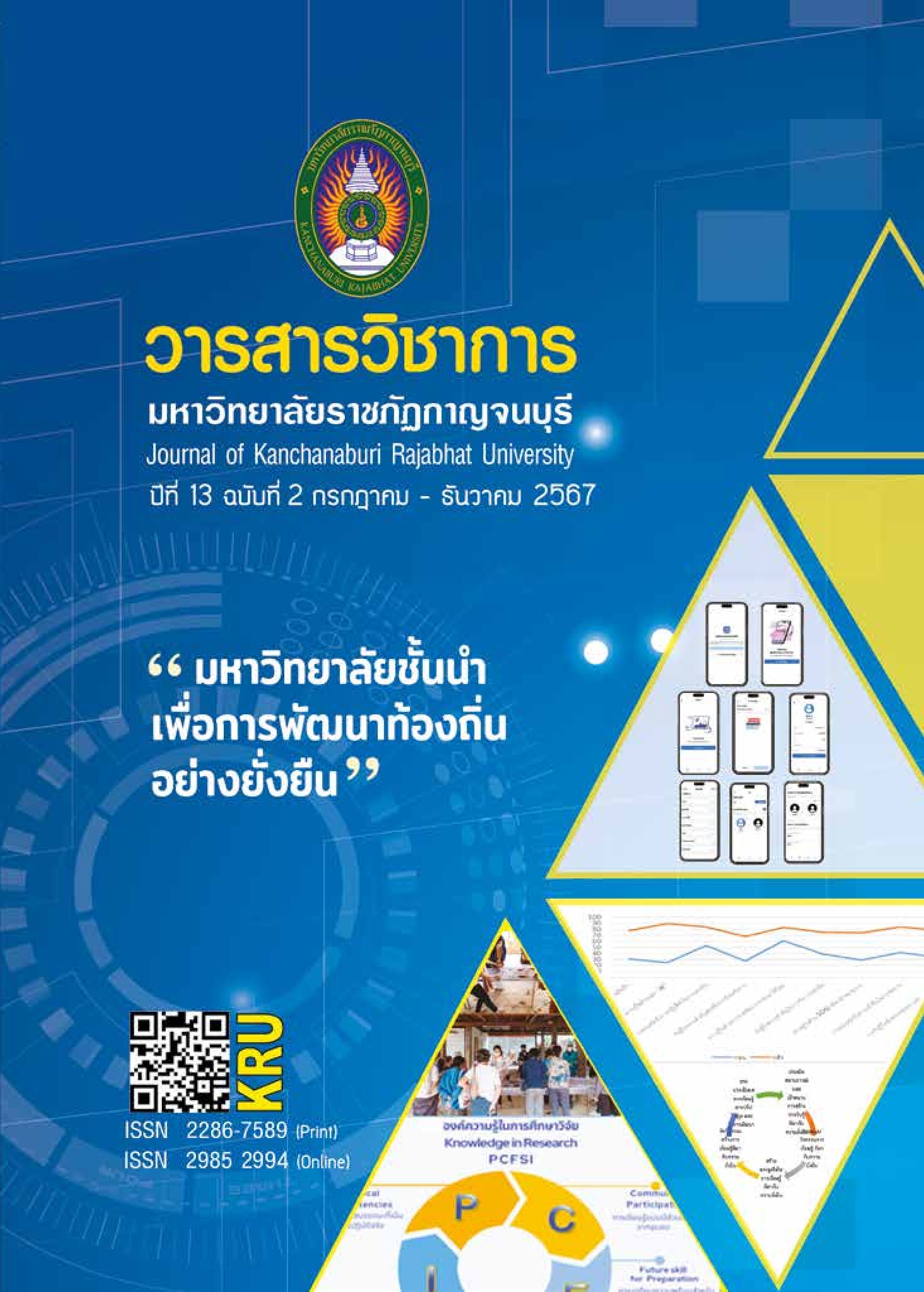แนวคิดการมุ่งเน้นการตลาดที่มีความสัมพันธ์กับความรับผิดชอบทางสังคมส่งผลต่อชื่อเสียงขององค์กรธุรกิจ: กรณีศึกษา บริษัทปูนซิเมนต์ไทย จำกัด (มหาชน)
Main Article Content
Abstract
การมุ่งเน้นการตลาด มี 3 องค์ประกอบหลัก ได้แก่ 1. การมุ่งเน้นด้านลูกค้า 2. การมุ่งเน้นด้านการแข่งขัน และ 3. การประสานงานภายใน ตามแนวคิดการมุ่งเน้นการตลาดมีวัตถุประสงค์เพื่อองค์กรสามารถดำเนินธุรกิจอย่างมีประสิทธิภาพและประสิทธิผล ส่วนความรับผิดชอบต่อสังคมประกอบด้วย 4 ด้าน ได้แก่ (1) ความรับผิดชอบต่อสังคมด้านเศรษฐกิจ (2) ความรับผิดชอบต่อสังคมด้านกฎหมาย (3) ความรับผิดชอบต่อสังคมด้านจริยธรรมและ (4) ความรับผิดชอบต่อสังคมด้านการกุศล เมื่อผู้บริหารและนักการตลาดให้ความสำคัญกับลูกค้าเพื่อจะมุ่งเน้นตอบสนองลูกค้าด้วยการรับผิดชอบต่อสังคม โดยการมุ่งเน้นการตลาดมีความสัมพันธ์และส่งผลเชิงบวกต่อความรับผิดชอบต่อสังคมซึ่งประเด็นความรับผิดชอบต่อสังคมยังอยู่ในความสนใจขององค์กรทั่วโลกและประเทศไทยเพราะการดำเนินธุรกิจขององค์กรส่วนใหญ่ได้ส่งผลกระทบต่อสิ่งแวดล้อมและสังคมทั้งทางตรงและทางอ้อมซึ่งองค์กรที่เกี่ยวข้องกับการดำเนินธุรกิจต้องให้ความสำคัญกับประเด็นความรับผิดชอบต่อสังคมที่ส่งผลเชิงบวกต่อผู้มีส่วนได้ส่วนเสีย เช่น ลูกค้า ผู้ถือหุ้น พนักงาน สาธารณชนทั่วไป รวมถึงความรับผิดชอบต่อสังคมที่ส่งผลต่อชื่อเสียงขององค์กรธุรกิจเป็นสิ่งที่มีมูลค่าสูงมากที่ส่งเสริมการดำเนินธุรกิจขององค์กรได้อย่างยั่งยืน ตามบทความนี้นำเสนอการประยุกต์ใช้แนวคิดการมุ่งเน้นการตลาดที่มีความสัมพันธ์กับความรับผิดชอบต่อสังคมเพื่อสร้างผลเชิงบวกด้านชื่อเสียงขององค์กรธุรกิจบริษัทปูนซีเมนต์ไทย จำกัด (มหาชน) ซึ่งเป็นองค์กรที่มีชื่อเสียงในด้านเป็นองค์กรธุรกิจแรกที่ได้รับการคัดเลือกให้อยู่ในดัชนีความยั่งยืนของ Dow Jones Sustainability Indices (DJSI) และมีชื่อเสียงในฐานะองค์กรธุรกิจจากการจัดอันดับต่อเนื่องยาวนานที่สุด 19 ปีติดต่อกันนับตั้งแต่ปี พ.ศ. 2547
Article Details

This work is licensed under a Creative Commons Attribution-NonCommercial-NoDerivatives 4.0 International License.
References
ตลาดหลักทรัพย์แห่งประเทศไทย, สถาบันพัฒนาธุรกิจอย่างยั่งยืน. (2559). ความรับผิดชอบต่อสังคมเพื่อความยั่งยืนขององค์กร (พิมพ์ครั้งที่ 3). ค้นเมื่อ ตุลาคม
, 2566, จาก https://setsustainability.com //download/rd7ajlx1w5sgbku.
บริษัทปูนซีเมนต์ไทย จำกัด (มหาชน). (ม.ป.ป.). บริษัทปูนซีเมนต์ไทย จำกัด (มหาชน) รายงานประจำปี 2565 แบบ 56-1 one report. ค้นเมื่อ ธันวาคม 2, 2566,
จาก https://scc.listedcompany.com/misc/ one-report/2022/20230228-scc-one-report2022-th.pdf.
ปาณัท เงาฉาย, และ รุ่งนภา พิตรปรีชา. (2555). ปัจจัยที่มีอิทธิพลต่อความมีชื่อเสียงของเอสซีจี ตามความคาดหวังของผู้มีส่วนได้ส่วนเสีย. วารสาร
การประชาสัมพันธ์และการโฆษณา, 5 (1), 21-43.
สานิตย์ หนูนิล วิโรจน์ เจษฎาลักษณ์ และ จันทนา แสนสุข. (2559). ความรับผิดชอบต่อสังคมขององค์กรธุรกิจ: ปัจจัยเชิงสาเหตุและผลลัพธ์. วารสารวิทยาลัย
ดุสิตธานี, 10 (2), 304-321.
Adeyemo, S., Oyebamiji, F., and Alimi, K. (2013). An evaluation of factors influencing corporate social responsibility in Nigerian
manufacturing companies. International Journal of Academic Research in Economics and Management Sciences, 2 (6), 54-63.
Barnett, M. L., Jermier, J. M., and Lafferty, B. A. (2006). Corporate reputation: The definitional landscape. Corporate Reputation Review,
(1), 26-38. doi:10.1057/palgrave.crr.1550012.
Barney, J. (1991). Firm resources and sustained competitive advantage. Journal of Management, 17 (1), 99-120,
doi:10.1177/014920639101700108.
Carroll, A. B. (1991). The pyramid of corporate social responsibility: Toward the moral management of organizational stakeholders.
Business Horizons, 34 (4), 39-48. doi:https://doi.org/10.1016/0007-6813(91)90005-G.
Dowling, G. (2001). Creating corporate reputations: Identity, image, and performance. Oxford: Oxford University Press.
El-Garaihy, W. H., Mobarak, A.-K. M., and Albahussain, S. A. (2014). Measuring the impact of corporate social responsibility practices on
competitive advantage: A mediation role of reputation and customer satisfaction. International Journal of Business and
Management, 9 (5), 109-124, doi:10.5539/ijbm.v9n5p109.
Gholami, S. (2011). Value creation model through corporate social responsibility (CSR). International Journal of Business and
Management, 6 (9), 148-154, doi:10.5539/ijbm.v6n9p148.
Ismail, M., Ibnu Kassim, M., Rozi Mohd Amit, M., and Mohd Rasdi, R. (2014). Orientation, attitude, and competency as predictors of
manager’s role of CSR-implementing companies in Malaysia. European Journal of Training and Development, 38 (5), 415-435,
doi:10.1108/EJTD-09-2013-0100.
Iszatt-White, M., and Saunders, C. (2014). Leadership. Oxford: Oxford University Press.
Kotler, P. T., and Armstrong, G. (2020). Principles of marketing (18th ed.). Harlow: Pearson Education.
Kotler, P., and Keller, K. L. (2021). Marketing management (16th ed.). Boston: Pearson.
McDaniel, C., Lamb, C. W., and Hair, J. F. (2012). Marketing essentials (7th ed.). Australia: South-Western/Cengage Learning.
Mostovicz, I., Kakabadse, N., and Kakabadse, A. (2009). CSR: The role of leadership in driving ethical outcomes. Corporate Governance:
The international journal of business in society, 9 (4), 448-460, doi:10.1108/14720700910984990.
Narver, J. C., and Slater, S. F. (1990). The effect of a market orientation on business profitability. Journal of Marketing, 54 (4), 20–35,
https://doi.org/10.2307/1251757.
Odriozola, M. D., Martín, A., and Luna, L. (2015). The relationship between labour social responsibility practices and reputation.
International Journal of Manpower, 36 (2), 236-251, doi:10.1108/IJM-03-2013-0039.
Pérez, A. (2015). Corporate reputation and CSR reporting to stakeholders. Corporate Communications: An International Journal, 20 (1),
-29, doi:10.1108/CCIJ-01-2014-0003.
Pirithiviraj, J. C. D., and Kajendra, K. (2010). Relationship between market orientation and corporate social responsibility with special
reference to Sri Lankan financial sector. Journal of Emerging Trends in Economics and Management Sciences, 1(2), 107-113,
https://hdl.handle.net/10520/EJC133838.
Prayukvong, P., and Olsen, M. (2009). Research paper on promoting corporate social responsibility in Thailand and the role of
volunteerism. In The network of NGO and Business Partnerships for Sustainable Development, commissioned by UNDP.
Retrieved from https://scholar.google.co.th/scholar_url? url=https://ngobiz.org/picture/File/Final%2520%
Report%2520on%2520CSR%2520Development%2520in%2520Thailand%2520(Original%2520Version).
.doc&hl=th&sa=X&ei=iQaNZc6-MaGJ6rQP9_y8yAg&scisig=AFWwaeahLZrdZV5Xh-p0taoQvp5V&oi=scholar.


